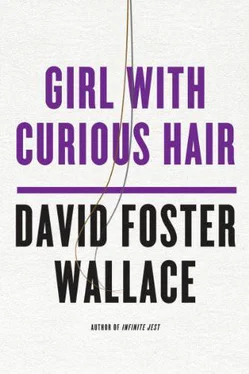David Wallace - Girl With Curious Hair
Здесь есть возможность читать онлайн «David Wallace - Girl With Curious Hair» весь текст электронной книги совершенно бесплатно (целиком полную версию без сокращений). В некоторых случаях можно слушать аудио, скачать через торрент в формате fb2 и присутствует краткое содержание. Год выпуска: 1996, Издательство: W. W. Norton & Company, Жанр: Современная проза, на английском языке. Описание произведения, (предисловие) а так же отзывы посетителей доступны на портале библиотеки ЛибКат.
- Название:Girl With Curious Hair
- Автор:
- Издательство:W. W. Norton & Company
- Жанр:
- Год:1996
- ISBN:нет данных
- Рейтинг книги:4 / 5. Голосов: 1
-
Избранное:Добавить в избранное
- Отзывы:
-
Ваша оценка:
- 80
- 1
- 2
- 3
- 4
- 5
Girl With Curious Hair: краткое содержание, описание и аннотация
Предлагаем к чтению аннотацию, описание, краткое содержание или предисловие (зависит от того, что написал сам автор книги «Girl With Curious Hair»). Если вы не нашли необходимую информацию о книге — напишите в комментариях, мы постараемся отыскать её.
). Girl with Curious Hair
Girl With Curious Hair — читать онлайн бесплатно полную книгу (весь текст) целиком
Ниже представлен текст книги, разбитый по страницам. Система сохранения места последней прочитанной страницы, позволяет с удобством читать онлайн бесплатно книгу «Girl With Curious Hair», без необходимости каждый раз заново искать на чём Вы остановились. Поставьте закладку, и сможете в любой момент перейти на страницу, на которой закончили чтение.
Интервал:
Закладка:
"Bruce perhaps here is the opportunity to confront the issue of your having on four separate occasions late last fall slept with a Simmons College sophomore from Great Neck, New York. Perhaps you'd care to discuss a certain Halloween party."
'Last summer was no fun, and when I'd tell him that at Christmas, he'd get mad, and tell me not to bring it up unless I was trying to really tell him something. I'd already started to be friends with the guy from Stats, but I wouldn't have even been interested in hanging around with him if things had been OK with Bruce and me.'
'I sleep and eat and sit around a great deal, and the red in my eye slowly fades. I wash insects' remains from my mother's windshield. For a time I devote most of my energy to immersing myself in the lives and concerns of two adults for whom I have a real and growing affection. My uncle is an insurance adjuster, though he's due for early retirement at the end of the year because of the state of his wind: the family worries about the possibility of his car breaking down on one of the uncountable Aroostook County roads he crisscrosses every day, adjusting claims. The winters here are killers. I have the feeling that when my uncle retires he will do nothing but watch television and tease my aunt and relate stories about the claims he adjusts. His stories are not to be believed. They all start with, "I had a loss once. ." He talks to me, in the living room, over the few beers he's allowed each day. He tells me that he's always been a homebody and a family man, that he loved spending time with his family — the children now grown and gone south, to Portland and Augusta and Bath — that there have been plenty of fools in his agency who spent all their time on their careers or their hunting or their golf or their peckers, and then what did they have, when winter came and the world got snowed in, after all? My aunt teaches third grade at the elementary school across town, and has the summer off, but she's taking two courses, a French and a Sociology, at the University of Maine's Prosopopeia branch downtown. For a few days after I'm rested I ride over with her to the little college and sit in the campus library while she's in class. The library is tiny, cute, like the children's section of a public facility, with carpet and furniture and walls colored in the muted earth-tones of autumn rot. There is hardly anyone in the summer library except two very heavy women who inventory the books at the tops of their lungs. It is at once too noisy and too quiet to do any real work, and I have no ideas that do not seem to me shallow and overwrought. I really feel, sitting, trying to extrapolate on the equations that have informed the last two years of my life, as though I'd been shot in the head. I end up writing disordered pieces, or more often letters, without direction or destination. What is to prove? It seems as though I've disproved everything. I soon stop going to the UMP library. Days go by, and my aunt and uncle are impeccably kind, but Maine becomes another here instead of a there.'
"Explain."
'Things become bad. I now have a haircut the shadow of which scares me. It occurs to me that neither my aunt nor my uncle has once asked what happened to the pretty little thing that came visiting with us last time we were up, and I wonder what my mother has said to my aunt. I begin to be anxious about something I can neither locate nor define. I have trouble sleeping: I wake very early every morning and wait, cold, for the sun to rise behind the gauzy white curtains of my cousins' old room. When I sleep I have unpleasant, repetitive dreams, dreams involving leopards, skinned knees, a bent old cafeteria fork with crazy tines. I have one slow dream in which she is bagging leaves in my family's yard in Indiana and I am pleading with her magically to present with amnesia, to be for me again, and she tells me to ask my mother, and I go into the house, and when I come out again, with permission, she is gone, the yard knee-deep in leaves. In this dream I am afraid of the sky: she has pointed at it with her rake handle and it is full of clouds which, seen from the ground, form themselves into variegated symbols of the calculus and begin to undergo manipulations I neither cause nor understand. In all my dreams the world is windy, disordered, gray.'
"Now you stop kissing pictures and tearing up proofs and begin to intuit that things are, and have been, much more general and in certain respects sinister all along."
'I begin to realize that she might never have existed. That I might feel this way now for a different — maybe even no — reason. The loss of a specific referent for my emotions is wildly disorienting. Two and a half weeks have passed since I came here. The receptacle is lying on the bureau in my room, still bent from the tollbooth. My affections have become a sort of faint crust on the photo, and the smell when I open the receptacle in the morning is chemically bitter. I stay inside all day, avoid windows, and cannot summon hunger. My testicles are drawn up constantly. They begin to hurt. Whole periods of time now begin to feel to me like the intimate, agonizing interval between something's falling off and its hitting the ground. My aunt says I look pale. I put some cotton in my ear, tell her I have an earache, and spend a lot of time wrapped in a scratchy blanket, watching Canadian television with my uncle.'
"This sort of thing can be good."
'I begin to feel as though my thoughts and voice here are in some way the creative products of something outside me, not in my control, and yet that this shaping, determining influence outside me is still me. I feel a division which the outside voice posits as the labor pains of a nascent emotional conscience. I am invested with an urge to "write it all out," to confront the past and present as a community or signs, but this requires a special distance I seem to have left behind. For a few days I exercise instead — go for long, shambling runs in jeans and sneakers, move some heavy mechanical clutter out of my uncle's backyard. It leaves me nervous and flushed and my aunt is happy; she says I look healthy. I take the cotton out of my ear.'
"All this time you're communicating with no one."
'I let my aunt do the talking to my parents. I do, though, have one odd and unsatisfactory phone conversation with my eldest brother, who is an ophthalmologist in Dayton. He smokes a pipe and is named Leonard. Leonard is far and away my least favorite relative, and I have no clue why I call him one night, collect, very late, and give him an involved and scrupulously fair edition of the whole story. We end up arguing. Leonard maintains that I am just like our mother and suffer from an unhappy and basically silly desire to be perfect; I say that this has nothing constructive to do with anything I've said, and that furthermore I fail to see what's so bad about wishing to be perfect, since being perfect would be… well, perfect. Leonard invites me to think about how boring it would be to be perfect. I defer to Leonard's extensive and hard-earned knowledge about being boring, but do point out that since being boring is an imperfection, it would by definition be impossible for a perfect person to be boring. Leonard says I've always enjoyed playing games with words in order to dodge the real meanings of things; this segues with suspicious neatness into my intuitions about the impending death of lexical utterance, and I'm afraid I indulge myself for several minutes before I realize that one of us has severed the connection. I curse Leonard's pipe, and his wife with a face like the rind of a ham.'
"Though of course your brother was only pointing out that perfection, when we get right down to the dark, cheese-binding heart of the matter, is impossible."
'There is no shortage of things that are perfect for the function that defines them. Peano's axioms. A chameleon's coat. A Turing Machine.'
Читать дальшеИнтервал:
Закладка:
Похожие книги на «Girl With Curious Hair»
Представляем Вашему вниманию похожие книги на «Girl With Curious Hair» списком для выбора. Мы отобрали схожую по названию и смыслу литературу в надежде предоставить читателям больше вариантов отыскать новые, интересные, ещё непрочитанные произведения.
Обсуждение, отзывы о книге «Girl With Curious Hair» и просто собственные мнения читателей. Оставьте ваши комментарии, напишите, что Вы думаете о произведении, его смысле или главных героях. Укажите что конкретно понравилось, а что нет, и почему Вы так считаете.












